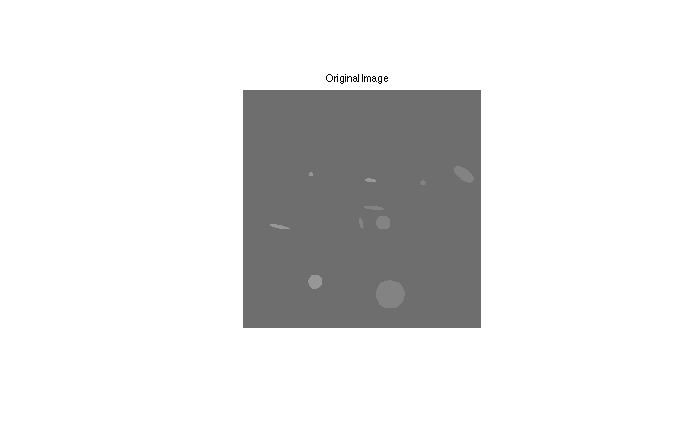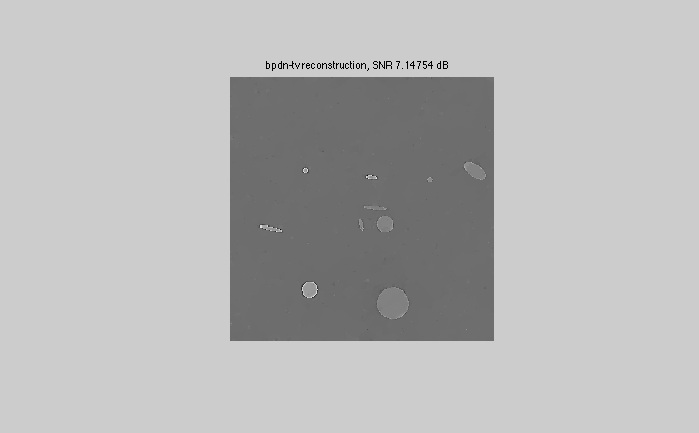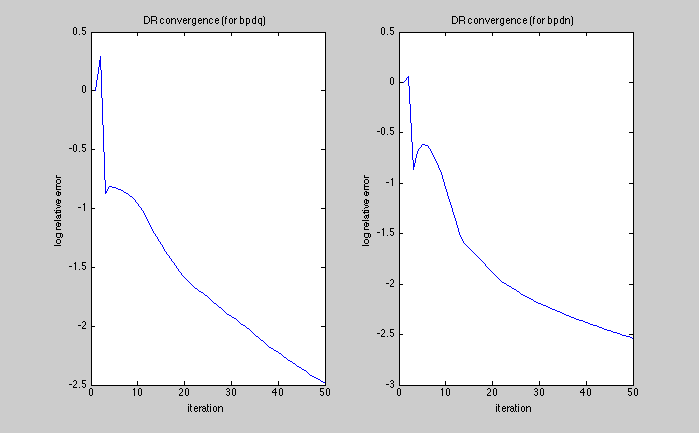Contents
% bpdq_demo_2d : Demo for BPDQ-TV reconstruction in 2-d % % This demo creates a synthetic angiogram image, takes randomly subsampled % Fourier measurements, and quantizes the measurements. % % Then the BPDQ-TV algorithm is run to reconstruct the image from the % quantized measurements. % % This file is part of BPDQ Toolbox (Basis Pursuit DeQuantizer) % Copyright (C) 2009, the BPDQ Team (see the file AUTHORS distributed with % this library) (See the notice at the end of the file.) % With parameters as set in this demo, execution time was 120 seconds % on 2.4 GHz Intel Core 2 Duo processor.
Demo Parameters
- N - image dimension (image will be NxN)
- nellipse - number of ellipses in syntheric angiogram
- fsubfactor - Fourier subsampling factor
- alpha - quantization bin width
- p - BPDQ moment (p=2 corresponds to standard BPDN)
Note: (Quantization threshold alpha is computed depending on nbins and on the signal instance)
N=256;
fsubfactor=6;
p=10;
alpha=50;
nellipse=10;
aseed=6;
seed=1;
bpdq_opts={'dr_gamma',.1,'dr_lambda',1,'dr_verbosity',0,'dr_maxiter',50};
dim=[N,N];
fprintf('Generating %g x %g synthetic angiogram\n',N,N);
im=bpdq_generate_angiogram(N,N,nellipse,aseed);
K=.5*floor(N^2/fsubfactor);
fprintf(['Selecting %g random fourier locations, i.e. 1/%i of the %g ' ...
'available\n'],2*K, fsubfactor, N^2);
rand('seed',seed);
[useind,loc]=bpdq_random_fourier_locations(dim,K,'forcecenter',1);
Generating 256 x 256 synthetic angiogram Selecting 10922 random fourier locations, i.e. 1/6 of the 65536 available
Defining Fourier subsampling operators
samp=@(x) bpdq_fft_subsample(x,useind,dim);
samp_t=@(x) bpdq_fft_subsample_t(x,useind,dim); % transpose of samp
Some utility functions
unpack complex vector into vector of reals
c2r = @(x) [real(x(:));imag(x(:))];
r2c = @(x) x(1:end/2)+sqrt(-1)*x(end/2+1:end);
% "complete" measurement operators (from sparsity domain to measurements)
A=@(x) samp((x(:)));
At=@(x) vec(samp_t(x));
Making measurements
fprintf('Computing quantized measurements alpha=%g\n',alpha); y=samp(im); % quantize yq=bpdq_quantize(y,alpha); Nbins=2*max(abs(c2r(y)))/alpha; % equivalent # of bins % fprintf('%g equivalent number of quantization bins\n',Nbins); % Compute epsilon for BPDQ program dM=numel(useind); M=2*dM;
Computing quantized measurements alpha=50
Running BPDQ-TV
fprintf('Running BPDQ-TV reconstruction with p=%g\n',p);
epsilon = bpdq_err_p(p,alpha,M);
[xstar,D_bpdq]=bpdq_2d_tv(yq,A,At,dim,epsilon,p,bpdq_opts{:});
im_bpdq=real(reshape(xstar,dim));
SNR_bpdq= bpdq_compute_snr(im,im_bpdq);
Running BPDQ-TV reconstruction with p=10
Running BPDN-TV (p=2)
fprintf('Running BPDN-TV (p=2) reconstruction\n');
epsilon2 = bpdq_err_p(2,alpha,M);
[xstar2,D_bpdn]=bpdq_2d_tv(yq,A,At,dim,epsilon2,2,bpdq_opts{:});
im_bpdn=real(reshape(xstar2,dim));
SNR_bpdn=bpdq_compute_snr(im,im_bpdn);
rmin=min([im(:);im_bpdn(:);im_bpdq(:)]);
rmax=max([im(:);im_bpdn(:);im_bpdq(:)]);
drange=[rmin,rmax];
Running BPDN-TV (p=2) reconstruction
Displaying results
fprintf('Displaying results and convergence curves\n'); figure(1) fprintf('Original Image in Figure 1\n'); bpdq_show_im(im,drange,1); title('Original Image'); figure(2) fprintf('BPDQ_%g Reconstruction in Figure 2\n', p); bpdq_show_im(im_bpdq,drange,1); title(sprintf('bpdq-tv (p=%g) reconstruction, SNR %g dB',p,SNR_bpdq)); drawnow; figure(3) fprintf('BPDN Reconstruction in Figure 3\n', p); bpdq_show_im(im_bpdn,drange,1); title(sprintf('bpdn-tv reconstruction, SNR %g dB',SNR_bpdn)); drawnow; figure(4) fprintf('Convergence Analysis in Figure 4\n'); subplot(1,2,1) plot(log10(D_bpdq.dr_relerr_save)); title('DR convergence (for bpdq)'); xlabel('iteration'); ylabel('log relative error'); subplot(1,2,2) plot(log10(D_bpdn.dr_relerr_save)); title('DR convergence (for bpdn)'); xlabel('iteration') ylabel('log relative error'); % The BPDQ Toolbox is free software: you can redistribute it and/or modify % it under the terms of the GNU General Public License as published by % the Free Software Foundation, either version 3 of the License, or % (at your option) any later version. % % The BPDQ Toolbox is distributed in the hope that it will be useful, % but WITHOUT ANY WARRANTY; without even the implied warranty of % MERCHANTABILITY or FITNESS FOR A PARTICULAR PURPOSE. See the % GNU General Public License for more details. % % You should have received a copy of the GNU General Public License % along with The BPDQ Toolbox. If not, see <http://www.gnu.org/licenses/>.
Displaying results and convergence curves Original Image in Figure 1 BPDQ_10 Reconstruction in Figure 2 BPDN Reconstruction in Figure 3 Convergence Analysis in Figure 4



